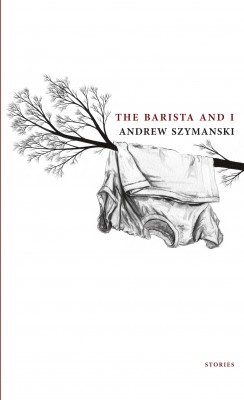I n his slim debut collection, The Barista and I, Andrew Szymanski concerns himself with the hollowed-out realities of young, seeking, male protagonists. Although most of the stories are blessed with short patches of energetic and intelligent prose, Szymanski’s vision suffers from his clumsy renderings of ambivalent and alienated interior lives. This is most visible in “The Recruit,” where a nameless protagonist hounds an unsuspecting female classmate and convinces her to come with him to Taiwan, where he secretly hopes to track down his ex-girlfriend (she bears the unpleasant moniker “the flower”).

The Barista and I
Andrew Szymanski
Insomniac Press
$19.95
paper
131pp
978-1-55483-084-8
Szymanski’s stories are often abruptly interrupted by his characters’ interior monologues dramatizing a perceived war of the sexes. In the story “After the Silence,” the main character, taking refuge in a café in order to escape the tense silence of the apartment that he shares with his girlfriend, notes:
Every woman appears a problem. I picture each of them sitting across the room from me with an idiotic glazed expression on her face, contorted in an attempt to mean deep contemplation.
In this moment and others like it, the writing seems too emphatic in its stereotyped distaste for women, taking away from the otherwise compelling estrangement of the characters.
But if solitude and the desire for connection are Szymanski’s primary fixations in this collection, then it is a mighty relief that the title story itself does a playful job at bringing these themes to life. In “The Barista and I,” we watch as a single sentence gives rise to a charming and funny flight of fancy: “And the sun was actually the moon and I was actually in love and the barista said ‘I love you too actually’ and everything was very actual and I felt good and I knew that it was good and right and true because I felt it.”
Here Szymanski turns skepticism into humorous enchantment and the language seems, finally, untethered.
Another moment of respite in this collection comes in the shape of “People I hardly Know,” a young man’s quiet drama at the laundromat. In this well-paced story, we tenderly shadow the comings and goings of a university student as he tries then fails then, finally, sort of, manages to make a connection with another human being. After encountering Leila, the laundromat attendant he has his eye on, he reflects:
We barely knew each other but I felt our relationship was very complex, and depending on the week, she either seemed pleased to see me or flustered and put-off, never neutral… I might not have thought about Leila much if I had many conversations, but I didn’t, so I did.
The story relies nicely on these simple moments of interiority to subtly convey the character’s complexity. The story’s ending also artfully suggests that desire is more complicated than its mere satisfaction.
The Barista and I, as a collection, doesn’t live up to the promise of its title story, but provides a few glimpses of salvaged humanity along the way. mRb






0 Comments